Improving communication and self-awareness is essential for personal and professional growth. Emotional intelligence skills, including self-awareness, empathy, and social skills, play a crucial role in enhancing interpersonal relationships. This article explores the key attributes of emotional intelligence, practical strategies for development, and the impact of unique traits on effective communication. Understanding and applying these skills can lead to better decision-making and deeper connections with others.
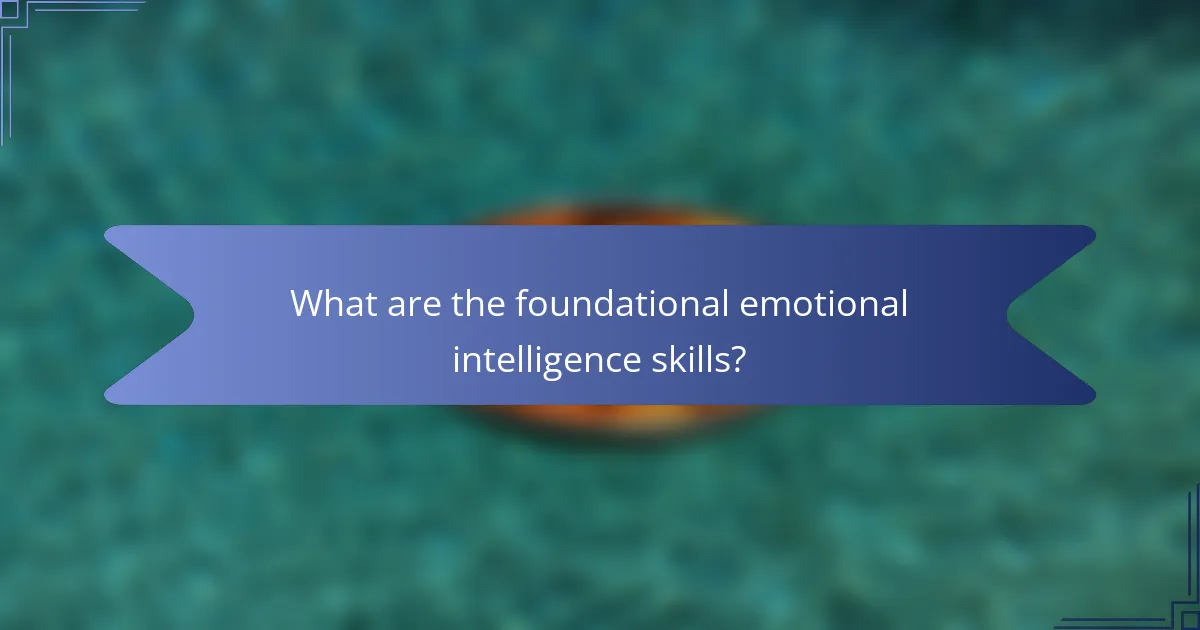
What are the foundational emotional intelligence skills?
Emotional intelligence skills include self-awareness, self-regulation, motivation, empathy, and social skills. These foundational abilities enhance communication and interpersonal relationships.
Self-awareness allows individuals to recognize their emotions and understand their impact on others. Self-regulation involves managing emotions effectively, leading to better decision-making. Motivation drives individuals to pursue goals with energy and persistence. Empathy enables understanding and sharing the feelings of others, fostering deeper connections. Social skills facilitate effective communication and conflict resolution, essential for teamwork and collaboration.
How does emotional intelligence enhance communication?
Emotional intelligence significantly enhances communication by fostering empathy, active listening, and self-awareness. Individuals with high emotional intelligence can recognize and understand emotions in themselves and others, leading to clearer and more effective interactions. This skill improves conflict resolution and promotes a collaborative environment, as emotionally intelligent individuals can navigate social complexities with sensitivity. As a result, teams benefit from increased trust and improved relationships, ultimately enhancing overall communication effectiveness.
What role does self-awareness play in emotional intelligence?
Self-awareness is crucial for emotional intelligence as it enables individuals to recognize their emotions and understand their impact on others. This awareness fosters better communication by allowing individuals to express themselves clearly and empathetically. Enhanced self-awareness contributes to improved interpersonal relationships and conflict resolution. Studies indicate that individuals with high self-awareness are more adept at managing stress and adapting to challenging situations, which further enhances their emotional intelligence.
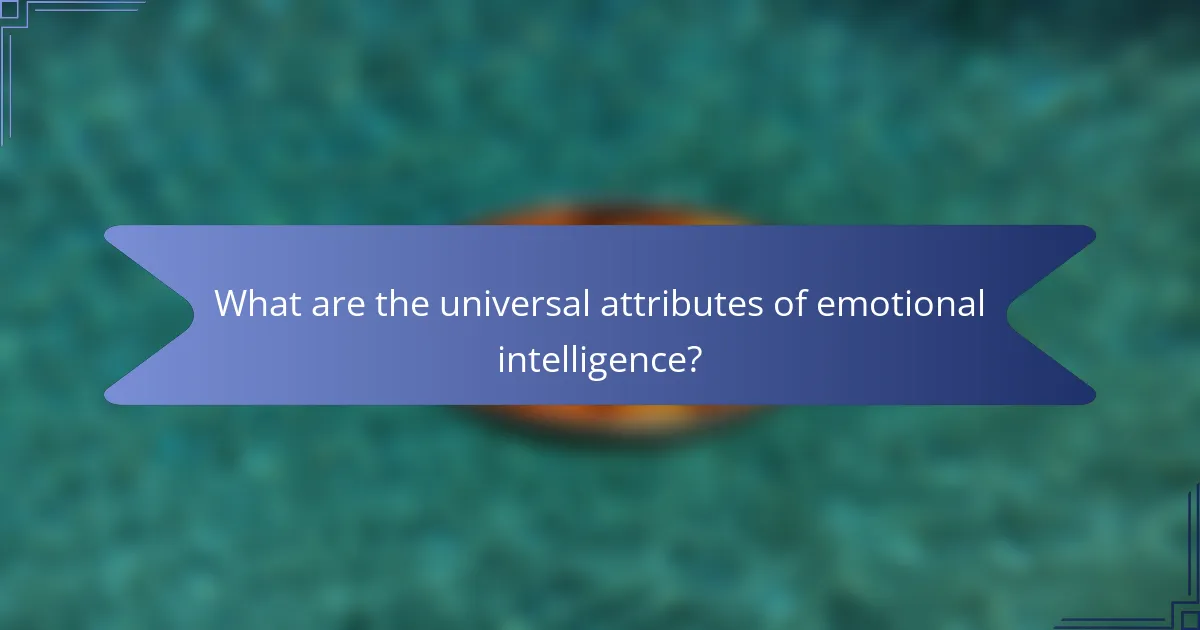
What are the universal attributes of emotional intelligence?
Emotional intelligence encompasses several universal attributes that enhance communication and self-awareness. Key attributes include self-awareness, empathy, emotional regulation, social skills, and motivation.
Self-awareness allows individuals to recognize their emotions and understand their impact on others. Empathy enables the ability to connect with others’ feelings, fostering deeper relationships. Emotional regulation involves managing and responding to emotional experiences effectively. Social skills facilitate effective communication and conflict resolution. Motivation drives individuals to achieve goals and maintain a positive outlook.
These attributes collectively contribute to improved interpersonal interactions and personal growth.
How can empathy improve interpersonal relationships?
Empathy significantly enhances interpersonal relationships by fostering understanding and connection. It allows individuals to recognize and validate each other’s feelings, leading to improved communication and conflict resolution. Empathy promotes trust and strengthens bonds, creating a supportive environment. As a result, relationships become more resilient and fulfilling, enhancing overall emotional intelligence skills.
What is the significance of active listening in communication?
Active listening enhances communication by fostering understanding and empathy. It involves fully concentrating, responding appropriately, and remembering key points. This skill is crucial for emotional intelligence, as it builds trust and reduces misunderstandings. Research indicates that effective active listening can improve relationship satisfaction by up to 50%. Practicing this skill leads to increased self-awareness and better conflict resolution, making it a unique attribute of successful communicators.
How does emotional regulation impact decision-making?
Emotional regulation significantly enhances decision-making by allowing individuals to manage their feelings effectively. This skill leads to clearer thinking and reduces impulsive choices. High emotional intelligence enables better recognition of emotions, which informs more rational decisions. As a result, individuals can weigh options objectively and consider long-term consequences.
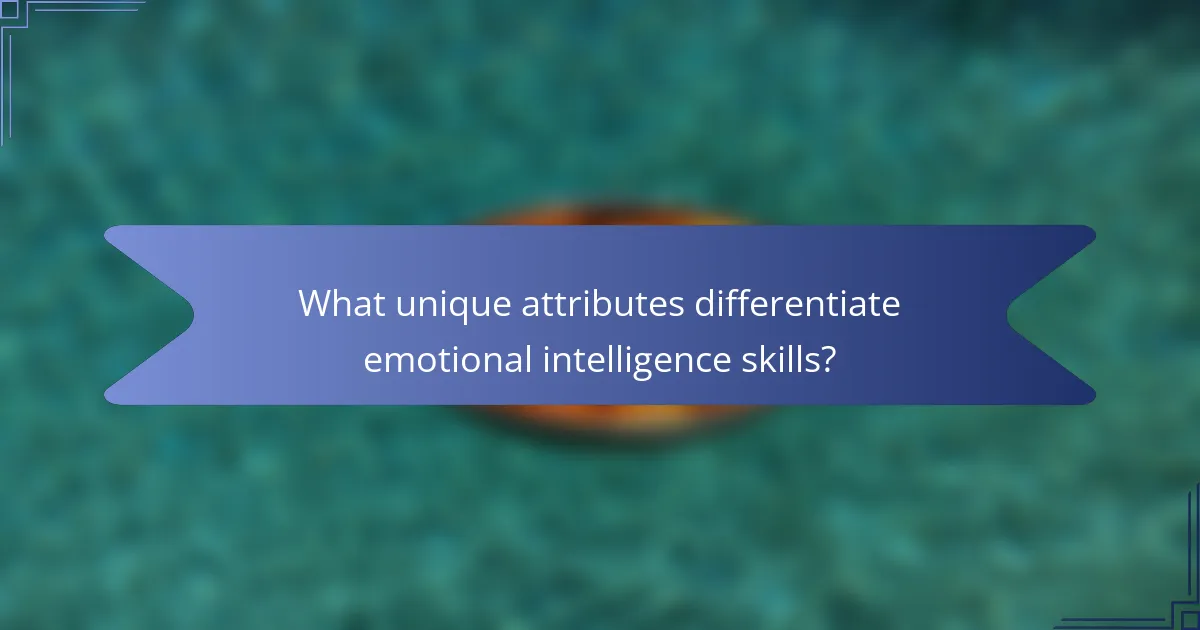
What unique attributes differentiate emotional intelligence skills?
Emotional intelligence skills are differentiated by attributes such as empathy, self-regulation, and social skills. Empathy enables understanding others’ emotions, while self-regulation helps manage one’s own feelings. Social skills facilitate effective communication and relationship-building. These unique attributes contribute to improved interactions and deeper self-awareness, essential for personal and professional growth.
How does cultural context shape emotional intelligence?
Cultural context significantly influences emotional intelligence by shaping how individuals perceive and express emotions. Different cultures have unique norms and values that dictate emotional responses and communication styles.
For instance, collectivist cultures prioritize group harmony, leading to more subdued emotional expressions, while individualistic cultures encourage open emotional expression. This variation affects interpersonal communication and self-awareness, as individuals adapt their emotional intelligence skills to align with cultural expectations.
Understanding these cultural nuances enhances the ability to navigate diverse social interactions, fostering better relationships and effective communication. Emotional intelligence skills, therefore, must be culturally contextualized to improve their applicability and effectiveness in varied environments.
What are the effects of emotional intelligence on leadership styles?
Emotional intelligence significantly enhances leadership styles by fostering effective communication and self-awareness. Leaders with high emotional intelligence can better understand their own emotions and those of their team, leading to improved collaboration and conflict resolution. This skill promotes empathy, enabling leaders to connect with team members on a personal level, which boosts morale and engagement. Additionally, emotionally intelligent leaders adapt their leadership styles to suit the needs of their team, resulting in more effective guidance and motivation.
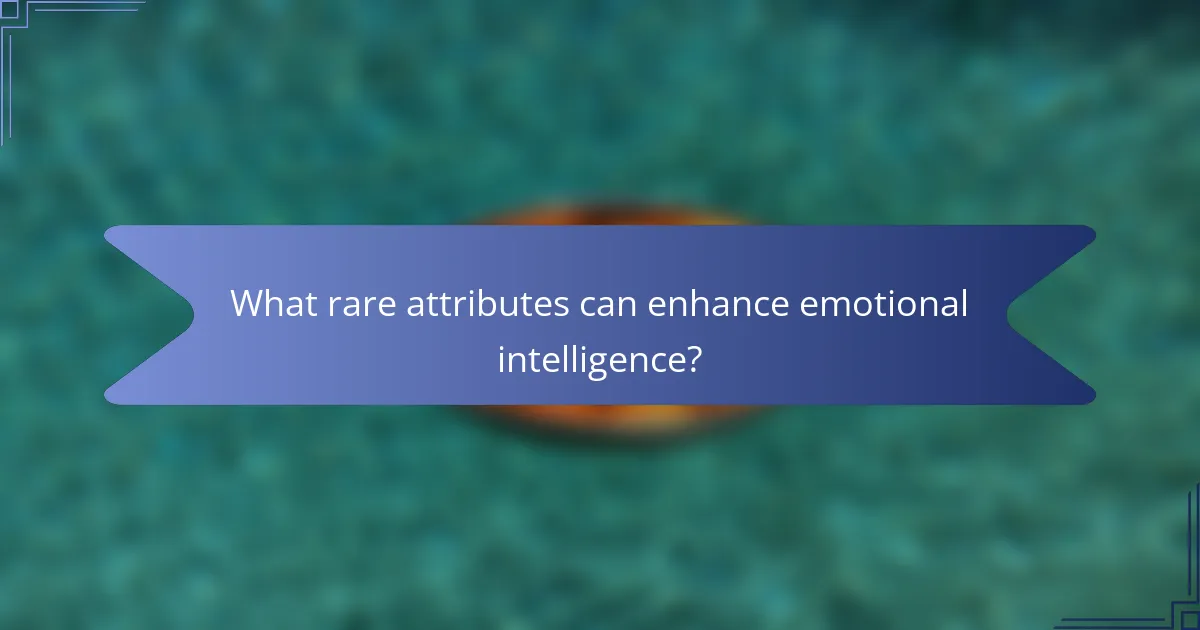
What rare attributes can enhance emotional intelligence?
Rare attributes that can enhance emotional intelligence include empathy for diverse perspectives, adaptability to changing emotional climates, and advanced conflict resolution skills. These traits foster deeper connections and understanding in communication. Additionally, a unique ability to recognize and manage one’s own emotional triggers can significantly improve self-awareness. Each of these rare attributes contributes to more effective interpersonal interactions and personal growth.
What is the impact of emotional intelligence on conflict resolution?
Emotional intelligence significantly enhances conflict resolution by fostering empathy and effective communication. Individuals with high emotional intelligence can recognize their own emotions and those of others, leading to better understanding during disputes. This skill set allows for collaborative problem-solving, reducing hostility and promoting constructive dialogue. As a result, conflicts are resolved more amicably, benefiting relationships and team dynamics.
How can emotional intelligence contribute to team dynamics?
Emotional intelligence enhances team dynamics by fostering effective communication and increasing self-awareness. Team members with high emotional intelligence can better understand and manage their emotions, leading to improved collaboration. This skill promotes empathy, allowing individuals to recognize and respond to the feelings of others, which builds trust and cohesion within the team. As a result, teams experience higher morale and productivity.
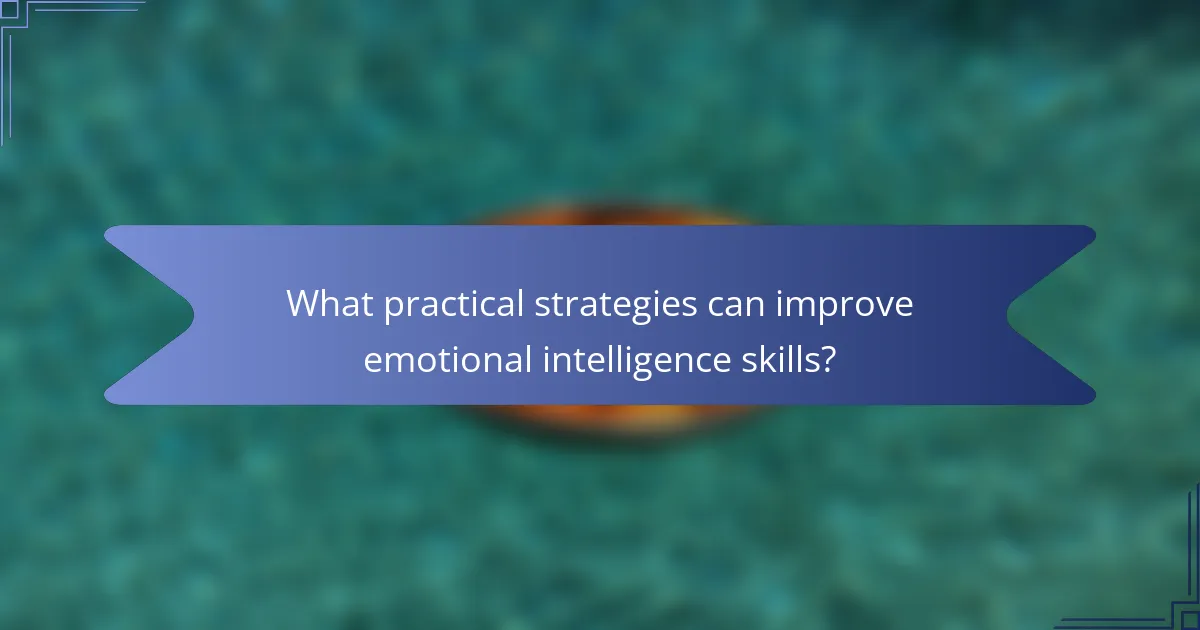
What practical strategies can improve emotional intelligence skills?
Improving emotional intelligence skills enhances communication and self-awareness. Practical strategies include active listening, practicing empathy, and reflecting on emotional responses.
Active listening involves fully concentrating on the speaker, which fosters better understanding and connection. Practicing empathy requires putting oneself in another’s shoes, enhancing relational dynamics. Reflecting on emotional responses encourages self-awareness, allowing individuals to recognize triggers and manage reactions effectively.
How can one develop self-awareness through feedback?
Developing self-awareness through feedback involves actively seeking and reflecting on input from others. This process enhances emotional intelligence, which is crucial for effective communication.
1. Request feedback regularly from trusted colleagues or friends.
2. Reflect on the feedback received, identifying common themes or insights.
3. Acknowledge emotional responses to feedback, using them as learning opportunities.
4. Set specific goals based on feedback to improve skills and behaviors.
5. Monitor progress and adjust actions based on ongoing feedback.
Consistent engagement with feedback fosters a deeper understanding of oneself, promoting personal growth and improved interpersonal relationships.
What are the best practices for enhancing empathy?
To enhance empathy, practice active listening, seek to understand others’ perspectives, and engage in reflective questioning. These strategies foster deeper connections and improve emotional intelligence. Additionally, exposing yourself to diverse experiences can broaden your understanding of different emotional responses. Prioritize self-awareness to recognize your own emotions and how they influence interactions.
What common mistakes should be avoided in emotional intelligence training?
Common mistakes in emotional intelligence training include neglecting self-awareness, failing to practice active listening, and overlooking the importance of feedback. Additionally, trainers may not tailor their approach to individual learning styles, which can hinder engagement. Ignoring real-life applications and not providing ongoing support can also diminish the effectiveness of training. These pitfalls can prevent participants from fully developing their emotional intelligence skills, which are crucial for improved communication and self-awareness.
How can emotional intelligence be measured effectively?
Emotional intelligence can be measured effectively through self-report assessments, peer reviews, and performance evaluations. These methods capture various aspects of emotional intelligence, including self-awareness, empathy, and interpersonal skills. Self-report assessments, like the Emotional Quotient Inventory, provide insights into personal perceptions. Peer reviews offer external perspectives on emotional interactions. Performance evaluations assess practical application in real-world scenarios, highlighting strengths and areas for improvement. Combining these approaches enhances measurement accuracy and provides a comprehensive understanding of emotional intelligence capabilities.